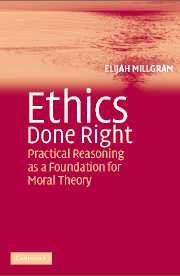Book contents
- Frontmatter
- Contents
- Acknowledgments
- Miscellaneous Frontmatter
- Introduction: The Method of Practical Reasoning
- 1 What's the Use of Utility?
- 2 Mill's Proof of the Principle of Utility
- 3 Does the Categorical Imperative Give Rise to a Contradiction in the Will?
- 4 Reasonably Virtuous
- 5 Murdoch, Practical Reasoning, and Particularism
- 6 Was Hume a Humean?
- 7 Hume on “Is” and “Ought”
- 8 Hume, Political Noncognitivism, and the History of England
- 9 Incommensurability and Practical Reasoning
- 10 Commensurability in Perspective
- 11 Varieties of Practical Reasoning and Varieties of Moral Theory
- References
- Index
8 - Hume, Political Noncognitivism, and the History of England
Published online by Cambridge University Press: 12 November 2009
- Frontmatter
- Contents
- Acknowledgments
- Miscellaneous Frontmatter
- Introduction: The Method of Practical Reasoning
- 1 What's the Use of Utility?
- 2 Mill's Proof of the Principle of Utility
- 3 Does the Categorical Imperative Give Rise to a Contradiction in the Will?
- 4 Reasonably Virtuous
- 5 Murdoch, Practical Reasoning, and Particularism
- 6 Was Hume a Humean?
- 7 Hume on “Is” and “Ought”
- 8 Hume, Political Noncognitivism, and the History of England
- 9 Incommensurability and Practical Reasoning
- 10 Commensurability in Perspective
- 11 Varieties of Practical Reasoning and Varieties of Moral Theory
- References
- Index
Summary
Hume was a nihilist about practical reasoning, that is, he held that there is no such thing as reasoning about what to do, because nothing could count as an inference to a practical conclusion. This was not just a counterintuitive position to hold – don't we have, after all, a well-entrenched practice of moral and especially political argumentation? – but a challenge to Hume's sense of intellectual responsibility: “nothing,” he thought, “is a clearer proof, that a theory [having to do with morals] is erroneous, than to find, that it leads to paradoxes, repugnant to the common sentiments of mankind, and to the practice and opinion of all nations and ages.” In what follows, I want to sketch Hume's attempt to persuade himself that his views on practical reasoning could accommodate not just the existence of the practice, but a nondismissive attitude towards it. I will explain how Hume's History of England was meant as an extended political and moral argument, and so as a very lengthy demonstration of how such argument (in a suitable sense of the word) could be managed even by someone who believed that practical reasoning was strictly speaking an impossibility.
Humean nihilism has attracted remarkably little attention, and showing how his History addressed an objection to it may accordingly seem to be of less than general interest. So I am going to superimpose on a relatively terse historical treatment some discussion of a problem in contemporary public life on which, I will suggest, Hume's efforts are an instructive preliminary attempt. I will call the problem Political Noncognitivism, and let me start with that.
- Type
- Chapter
- Information
- Ethics Done RightPractical Reasoning as a Foundation for Moral Theory, pp. 247 - 272Publisher: Cambridge University PressPrint publication year: 2005



